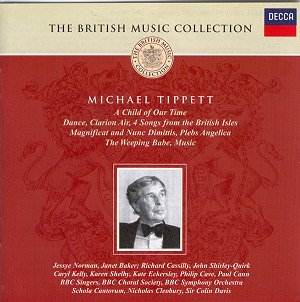A
Child of our Time works through its emotionalism and through
the masterfully interpolated spirituals juxtaposed with neo-Handelian
monumentalism. Colin Davis seems to have been strongly favoured
by the composer but here the work develops a lumbering gait that
is at odds with the message. Gravitas by all means but this is
a case of severity lurching towards the ungainly. The sound-image
is rather congested too. This is not classic Philips sound. The
engineers do however make the most of Tippett's writing for women's
voices and the singing of the BBC Choral Society and BBC Singers
has a massy weight and a glow as if from behind hammerhead storm
clouds. Jessye Norman, perhaps at the peak of her powers when
this was made, is simply superb. People speak highly of Tippett's
Collins CD (I have not heard it) but I hope that the early Decca
recording made by John Pritchard will find its way onto CD. Now
which of you remembers the calamitously obtuse LP sleeve design
for Davis's version when first issued in 1975?
At
the other end of the spectrum comes an hours worth of smaller
a cappella choral items. The second CD uses a smaller number
of voices achieving delicacy and transparency. It points up the
density of sound of the first disc. Not a great deal to be said
really except that this is all Tippett at his most melodically
beguiling. The highlights include the Four Songs from the British
Isles with apt instrumental insurgents and the Negro Spirituals
lifted from their monumental stone and iron setting and grouped
together to uplifting effect.
The
booklet is a very decent production in which the full text of
A Child of Our Time is reproduced but there is no sign
of the words of the short choral items.
Rob
Barnett
